Laurent Dedieu is a logistics supervisor for Doctors Without Borders/Médecins Sans Frontières (MSF) projects in Haiti. Since the earthquake that hit Port-au-Prince on January 12, he has been in frequent contact with the teams on the ground and helping to organize the logistics of MSF’s response. Here he describes the logistical challenges the teams are dealing with right now.
What are the logistical problems the teams are dealing with today?

Pakistan 2005 © MSF
Above, MSF used an inflatable hospital in Pakistan in 2005 consisting of seven tents. The set-up in Port-au-Prince will include nine tents.
Right now we still are struggling to treat patents in very rough conditions. The biggest problem is not having medical structures where we can treat them. But we have been able to find an open space big enough for the inflatable hospital that should arrive tomorrow. So we will have a 100-bed hospital with surgical capacity operation before the end of next week.
What about other logistical factors required for surgery – water, electricity?
We have roughly a week’s worth of water in stock and we have generators for electricity. The hospital is coming fully logistically equipped, including sanitation, x-ray machines, everything. It's a kind of plug and play hospital.
But a big issue will be the supply of fuel. We cannot find any diesel fuel in the city. At the MSF projects I am in touch with, today we have roughly two to three days maximum of fuel in stock. So we need to start work on an emergency supply chain, either from Santo Domingo in the Dominican Republic, or from Miami, we don't know yet which will be the best way.
And how will the teams receive other supplies?
Today we have 20 international staff arriving in Port-au-Prince, tomorrow 15 more should arrive. Along with them, two full charter planes are coming with the hospital and medical supplies from our stocks in Bordeaux. This is our top priority. After that the priority is to establish a supply chain. Before the earthquake all the goods were available in Haiti, imported from the US. But those companies will not be able to establish a proper supply chain for weeks maybe, so we will have to organize our own.
We know the road from Santo Domingo is open. And we are assessing the possibility of using sea transport, but the problem is that the city’s port is damaged. So we may have to use one of the country’s other ports that are not damaged.
Are there still a lot of problems with air transport?
Air transport is still very difficult. The main issue is the limited capacity of the Port-au-Prince airport. It cannot admit more than certain number of planes on the ground at one time and landings have to stop when that number is reached, and if some planes stay on the ground longer than expected, you have delays. Because of damage and lack of lighting, the airport does not have landings at night, so you have half as many hours as normal to arrive. I don't know when that will be resolved. It means you have to spend a lot of time contacting the authorities, pushing people to allow our plane to land.
With such a huge need for food and water in Port-au-Prince, will MSF be addressing these needs?
Basically you have 3 million people with no more access to food, water, or sanitation. It's a huge challenge and while we cannot help the whole city, it is likely that MSF will be able to address part of this problem. We are not providing water right now, but when we do, we will need to establish some water sources that are accessible and not contaminated. As a second step we will need to think about other strategies, perhaps drilling boreholes or water treatment - maybe treating salt water since it is by the ocean.
Have MSF teams run into any security issues so far?
No, but the population there is still very nervous and a lot of rumors have been flying about a second earthquake and rising sea levels. It could create some kind of panic. There is also tension about the lack of food and water. We have standard MSF security rules – identifying ourselves; limiting movements after dark; limiting where we go; no guns in the medical facilities, of course; and close follow-up with the community. And the high quality of our interventions also provide a measure of security.



